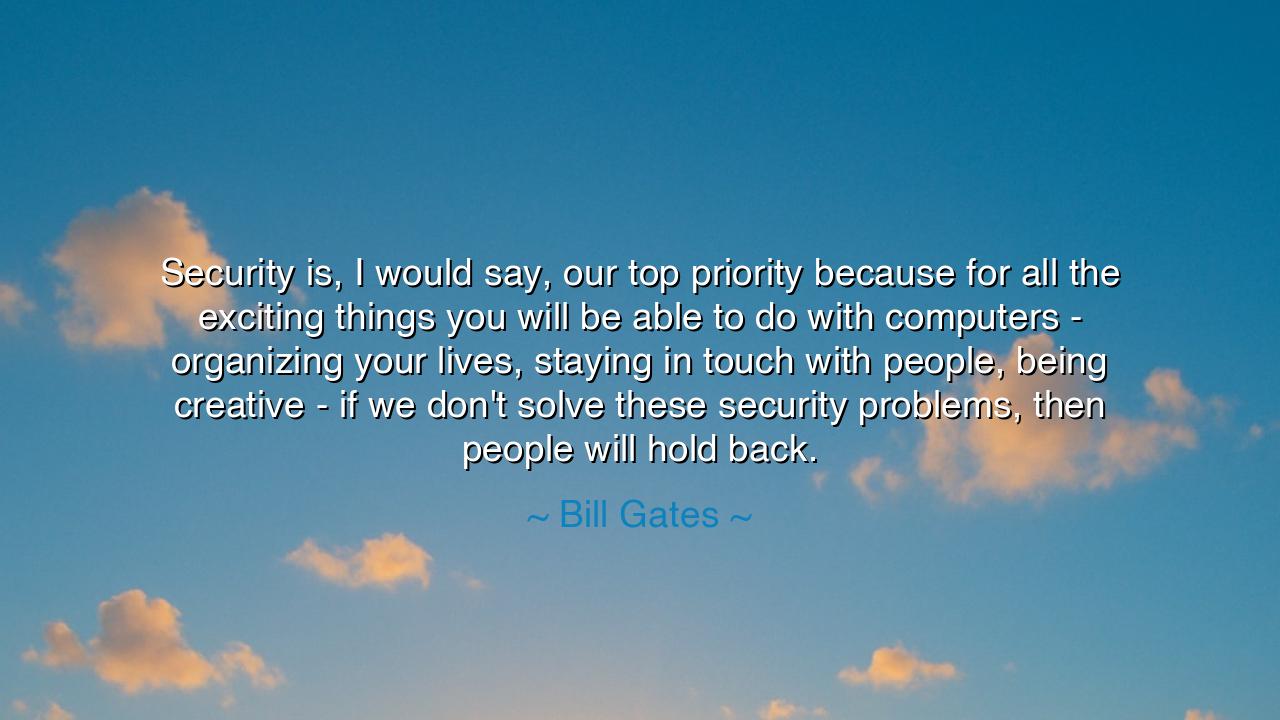
Security is, I would say, our top priority because for all the
Security is, I would say, our top priority because for all the exciting things you will be able to do with computers - organizing your lives, staying in touch with people, being creative - if we don't solve these security problems, then people will hold back.






Bill Gates’ words, “Security is, I would say, our top priority because for all the exciting things you will be able to do with computers—organizing your lives, staying in touch with people, being creative—if we don't solve these security problems, then people will hold back,” carry a profound truth that echoes through both the digital age and the ancient world. Security, in its essence, is the foundation upon which all progress is built. Gates underscores that without trust and protection, the promise of technological advancement—whether in creativity, communication, or organization—becomes fragile, and the full potential of innovation cannot be realized. This insight is not just relevant to our digital age; it mirrors the timeless wisdom of the ancients, who recognized that without a solid foundation of security, nothing can endure, and nothing can truly flourish.
In the ancient world, societies were founded not only on the brilliance of their philosophers and warriors, but on the strength of their defenses. The walls of Troy, for instance, were legendary in their impenetrability, symbolizing the importance of security in the stability of a civilization. Without the protection of these walls, Troy’s cultural wealth, ideas, and advancements could not have thrived. Similarly, the Romans built fortifications and military systems that allowed their empire to extend its influence across the known world. Security, in these instances, was not just a defensive measure—it was a precautionary action to preserve progress and sustain growth. Without a secure foundation, their empire would have crumbled under the weight of external threats, just as modern technologies would falter without digital security.
The importance of security is also evident in the story of Alexander the Great, whose military success relied on not only his brilliant tactics but also the security of his supply lines and communication networks. His empire was vast, stretching from Greece to India, and to keep such a domain intact, Alexander’s forces had to ensure their communications were secure, their resources protected, and their supply lines uninterrupted. His rise to power was not just a result of strategic brilliance, but also the protection of his forces and their ability to maintain order within the vast territories they conquered. In a similar vein, the promise of modern technological growth cannot be realized without first ensuring the security of the systems that underpin them.
Gates’ quote speaks directly to the paradox of progress. Just as ancient empires understood the need to secure their physical borders to maintain stability, modern societies must secure their digital borders to preserve the promise of the digital age. The Internet—the great connecting force of our time—brings with it not only opportunity, but also unprecedented vulnerabilities. In our increasingly networked world, our personal data, communications, and even our identities are exposed to the threat of hackers, fraud, and manipulation. As Gates points out, without addressing these security challenges, the exciting potentials of technology will remain unrealized, and individuals will hesitate to engage with the full benefits of the digital age.
Consider the example of the Enigma machine used by the Nazis during World War II. The machine, thought to be secure and unbreakable, was eventually cracked by the British mathematician Alan Turing and his team. This breakthrough in cryptography was a pivotal moment in the war, and it demonstrates the immense power of security in shaping the course of history. The codebreakers at Bletchley Park didn’t just uncover hidden messages—they protected vital information, enabling the Allies to gain crucial advantages. In a similar way, today’s security systems—from firewalls to encryption—play a critical role in safeguarding the vast amounts of information exchanged across the digital landscape. Without such protections, the exciting opportunities that technology offers could be easily hijacked by those seeking to exploit them.
The paradox Gates speaks of is one of the greatest challenges of our time: how do we balance innovation with security? In the ancient world, the ancient Egyptians knew the importance of balancing progress with protection—building the Great Pyramids with enduring materials that would last through the ages, and securing their knowledge with hieroglyphics that told the story of their civilization. The wisdom of the ancients teaches us that advancement without a foundation of security is like building a great tower on shifting sand—it may rise quickly, but it will ultimately collapse. Digital security, like the walls of the ancient empires, serves as the bedrock of our modern digital civilization, allowing it to thrive and grow.
Lesson for the ages:
The future of any civilization, whether ancient or modern, lies not only in its capacity to innovate, but in its ability to secure that innovation. As Bill Gates reminds us, without security, even the greatest advancements become fragile. Just as the ancient empires understood the need for defenses to protect their people and resources, so too must we recognize the importance of securing the digital systems that define our world. Security is not just a protective measure; it is the foundation that supports all progress.
Practical Action:
As you engage with technology, whether for work, communication, or creativity, remember the importance of security. Take active steps to protect your digital presence: use strong passwords, enable two-factor authentication, and stay informed about the latest cybersecurity practices. Advocate for better security measures in your community and workplace, ensuring that the tools we use today are protected for the generations to come. Just as the ancients fortified their borders to ensure their civilization’s endurance, we must fortify our digital lives to ensure a safe and secure future for all.






AAdministratorAdministrator
Welcome, honored guests. Please leave a comment, we will respond soon